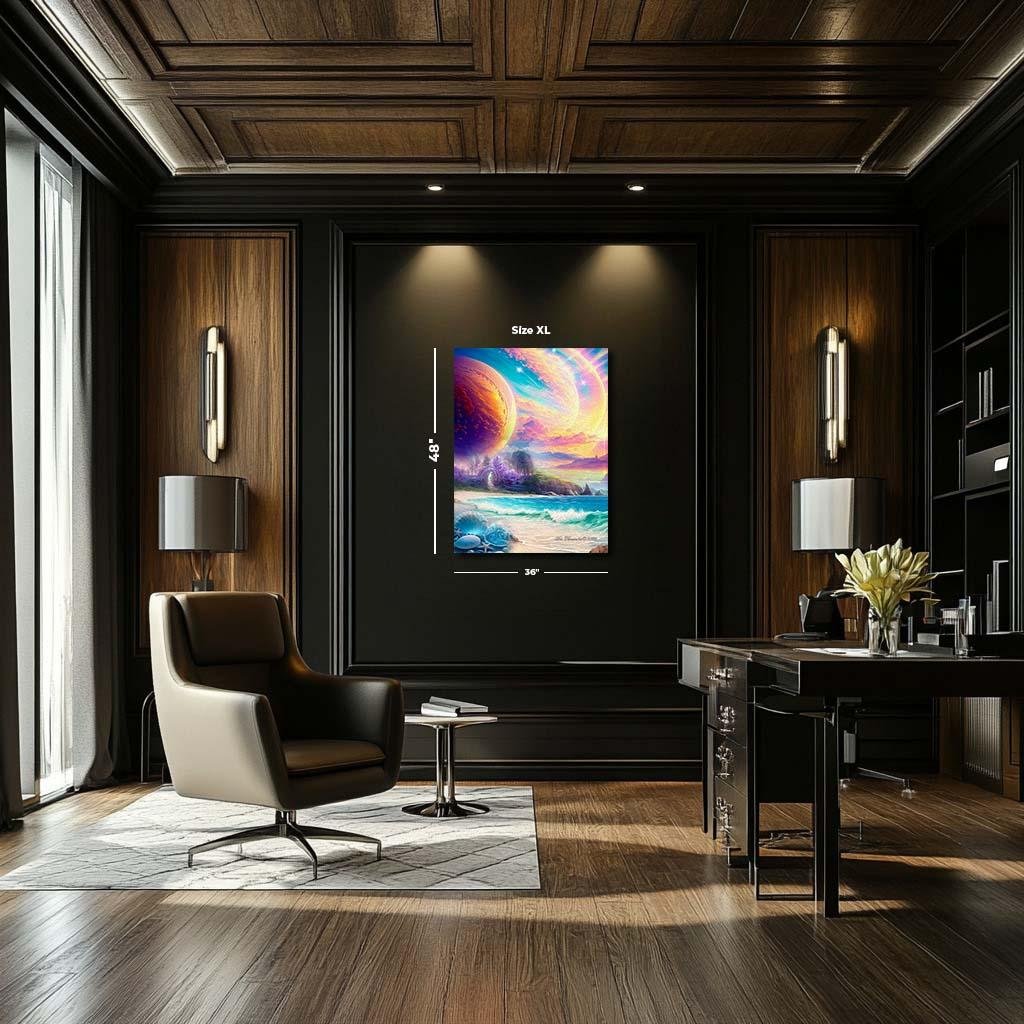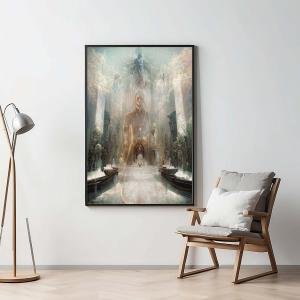The Burden of Vanity and Quiet Peace
This deeply layered artwork portrays the essence of inner turmoil and the tension between worldly ambitions and spiritual quietness. In the upper half of the image, the viewer is drawn into a landscape dominated by towering, sharp structures — a symbolic representation of human ambition and achievement. These spires rise high into the heavens, representing the "travail and every right work" that is often admired or envied by others. The architecture is grand, yet cold and lifeless, reminiscent of achievements built on the pursuit of vanity, power, and external validation.
Please see Below for Details…
Hotline Order:
Mon - Fri: 07AM - 06PM
404-872-4663
In contrast, the lower half of the image features a softer, more serene scene. A single figure sits in solitude, folding their hands gently, as they gaze into a calm, glowing horizon. The colors here shift from cold blues to warm, peaceful hues of orange and gold, symbolizing the transition from a state of striving and vexation to one of quietness and inner peace. The "handful with quietness" is visually expressed as a light held in the figure's palms, gently illuminating the space around them.
There is a clear dichotomy in the image — above, the oppressive towers represent the endless toil and comparison that lead to "vexation of spirit," while below, the calm figure embodies the peaceful acceptance of a life lived in simplicity. The peacefulness of the lower figure suggests that fulfillment is found not in endless work or external validation, but in inner stillness and balance.
In this artwork, the verses from Ecclesiastes 4:4-7 take on visual form, bringing the themes of human vanity, toil, and the folly of envy into stark relief. The towering structures symbolize the constant "travail and every right work" that people pursue — work that is often praised, envied, or admired by others. However, Ecclesiastes reminds us that this kind of ambition, when driven by external comparison, is ultimately "vanity and vexation of spirit." The cold, lifeless buildings echo the hollow nature of such achievements.
The central figure below, folding their hands in quiet contemplation, contrasts sharply with the upper scene. They represent the idea that "better is an handful with quietness, than both the hands full with travail." This notion is captured in the art’s soft light, suggesting that true peace comes from contentment with less — a life not driven by materialism, success, or the approval of others, but by quiet fulfillment and spiritual serenity.
The "fool" mentioned in the passage is depicted in the upper half of the image, the one who toils endlessly, trying to fill both hands with work, only to find themselves consumed by the very process, metaphorically "eating their own flesh." Their ambition becomes self-destructive, driving them to a restless, unfulfilled state.
These verses offer a powerful reminder to resist the temptation of measuring one's worth by the standards of others. The artwork highlights the oppressive nature of constant striving for external validation, which can lead to envy, jealousy, and dissatisfaction. In today’s world, where social media amplifies comparison and competition, this wisdom encourages people to seek inner peace rather than chasing the next accomplishment for the sake of appearing successful.
The contrast between the figure in quiet reflection and the towering structures above speaks to the need for balance in life. Instead of striving for both hands full of work and vexation, the verses suggest that one handful — a life of balance, simplicity, and quietness — is far better. This is a powerful antidote to the hustle culture prevalent in modern society, where the pressure to achieve can overshadow the need for rest, stillness, and meaningful living.
"Better is a handful with quietness" offers an invitation to find contentment in simplicity, to let go of the need for more, and to find peace with less. This is a profound lesson for those who feel the constant drive to accumulate more wealth, possessions, or recognition. The art mirrors this biblical truth by visually depicting the quiet beauty of peace, as opposed to the grand but hollow achievements of the material world.
The verses from Ecclesiastes invite deep reflection on what is truly meaningful in life. By recognizing the "vanity under the sun," the Bible encourages people to pause and question the purpose of their labor. Is it for the joy of the work itself, or for the approval of others? The artwork suggests that only by rejecting the empty pursuit of vanity can one find true fulfillment.
"The Burden of Vanity and Quiet Peace" is a visual meditation on the eternal struggle between external achievement and inner peace. Drawing on Ecclesiastes 4:4-7, it brings to life the tension between striving for worldly success, often driven by envy, and finding contentment in a simple, quiet life. The art calls viewers to reflect on their own lives, asking whether they are building empty towers of toil or seeking the peaceful illumination of a handful of quietness. Through the lens of this ancient wisdom, the artwork offers a modern message of balance, mindfulness, and the rejection of vanity.
Add your review
Your email address will not be published. Required fields are marked *
Please login to write review!
Looks like there are no reviews yet.








